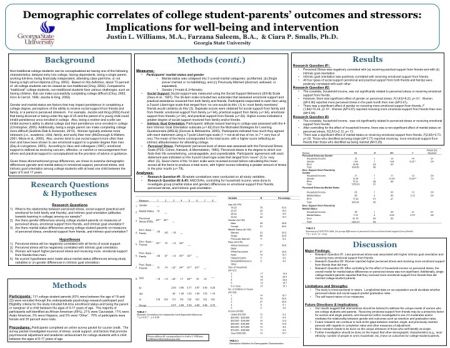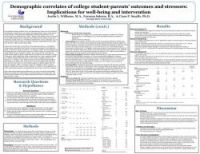
Demographic correlates of college student-parents’ outcomes and stressors: Implications for well-being and intervention
Justin L. Williams, M.A., Farzana Saleem, B.A., & Ciara P. Smalls, Ph.D.
Georgia State University
Non-traditional college students can be conceptualized as having one of the following characteristics: delayed entry into college, having dependents, being a single parent, working full-time, being financially independent, attending class part-time, or not having a high school diploma (Choy, 2002). Based on this definition, about 73 percent of all college students can be viewed as non-traditional (Choy, 2002). Compared to “traditional” college students, non-traditional students face various challenges, such as having children, that can make successfully completing college difficult (Choy, 2002; Horn & Carroll, 1996; Jacobs & King, 2002).
 Justin L. Williams, M.A., Farzana Saleem, B.A., & Ciara P. Smalls, Ph.D. Georgia State University
Justin L. Williams, M.A., Farzana Saleem, B.A., & Ciara P. Smalls, Ph.D. Georgia State University
Justin L. Williams, M.A., Farzana Saleem, B.A., & Ciara P. Smalls, Ph.D.
Georgia State University
Add Comment
![]() Download the PDF version to access the complete article.
Download the PDF version to access the complete article.
Keywords: well-being, community psychology, gjcpp